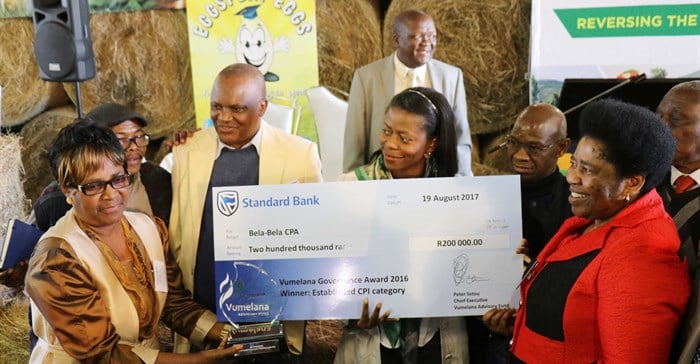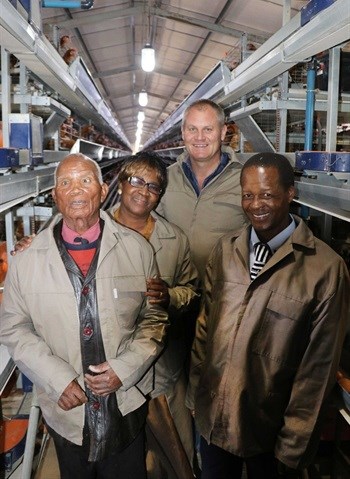During a ceremony held in Bela-Bela, Limpopo where the Deputy Minister of Rural Development and Land Reform, Candith Mashego-Dlamini delivered the keynote address, Vumelana Advisory Fund announced that the Bela-Bela Communal Property Association (CPA) from Limpopo has won the 2016 Vumelana Governance Awards, in the category for established communal property institutions (operational for more than 10 years), while the Jabulani AgriVillage CPA from Mpumalanga won the category for emerging communal property institutions (operational for less than 10 years).

Chairperson receiving award from deputy minister and Vumelana
The Vumelana Advisory Fund is a non-profit organisation that helps communities in the land reform programme put their land to profitable use by establishing commercially viable partnerships between communities and investors. Vumelana launched the Vumelana Governance Awards in 2014 to incentivise and reward good corporate governance practices by communal land holding entities that have benefited from government’s land reform programme and are registered under the Communal Property Associations Act and the Trust Property Control Act.
As part of the adjudication process, four communal property institutions were shortlisted and underwent site visits during which independent assessors assessed their track record in the following five areas:
• ensuring that the CPI is properly constituted, with an approved constitution, membership register and approved policies and procedures
• producing management accounts and audited annual financial statements
• administering the property and other resources under its control through an effectively organised and managed office
• maintaining effective social cohesion among members by, among other things, effective and consistent reporting to members via an AGM and other means.
“In the last three years, we have seen beneficiaries of land reform begin to realise the importance of good governance practices,” said Peter Setou, chief executive, Vumelana Advisory Fund.
Basic requirements for good governance ramins a challenge
Setou highlighted that compliance with basic requirements for good governance remains one of the biggest challenges that beneficiaries of the land reform programme face.
According to the Communal Property Associations Act 28 of 1996, CPAs are required to hold annual general meetings and submit basic information to the Department Rural Development and Land Reform (DRDLR). The information required includes the names of committee members, minutes of Annual General Meetings, a schedule of dealings in land and financial statements.
However, most CPAs are unable to comply with these basic requirements. Some of the main challenges reported in the Communal Property Associations 2015-2016 Annual Report include issues around:
• the election of new committee members which are often obfuscated by the previous committees whose term of office has expired;
• that committee members often use the resources of the CPAs for their personal benefit;
• that committee members do not keep proper records of CPA finances and minutes of meetings where major decisions are taken regarding the assets of the CPAs;
• unaccountability of the CPA executive committee is prevalent where the CPA is used both as a land-holding entity and business entity.
• provincial officials who facilitated the establishment CPAs are expected to continue supporting CPAs.
“Our aim is to incentivise communities in the land reform programme adopt good governance structures, in order to position themselves as commercially viable for partnerships with investors,” says Setou. He pointed out that well governed communal property institutions and associations can become more effective drivers of development on land under their administration for the benefit of their members and the country.

Bela-Bela CPA
Bela-Bela CPA's secret to success
“The secret to our success is that we have managed to separate CPA issues from the business operations, and we follow a business plan agreed upon by all beneficiaries of our CPA,” said Chief Barrington Mabuela from the Bela-Bela CPA, which walked away with the R200,000 award, speaking at the Bela-Bela prize giving ceremony held on their farm over the weekend. He explained that the Bela-Bela CPA produces its own maize, has a cattle production and egg production farm with the capacity of 120,000 egg-laying chickens.
The Bela-Bela CPA works in partnership with Eggspert Eggs – a distributor that buys eggs from the CPA and sells to retail stores.
Resulting from its successful model, the Bela-Bela community wrote a book, titled The best land restitution model of South Africa, which showcases the Bela-Bela CPA model. The CPA has hosted various universities from the SADC region and other countries such as Uganda, Tanzania, Kenya, and Utopia to share best practices with agriculture students. At the event, the Bela-Bela CPA also launched its maize meal brand – the Bela-Bela maize meal, that will be available in various stores across the country.
“There are a number of challenges with CPAs, and one of the biggest challenges is that when CPAs get the farms, there is never adequate planning on what will happen thereafter or business planning for the land, and this is an area that requires a lot of planning to ensure that CPAs become sustainable,” said Mafika Vilakazi, Chairperson of the Jabulani AgriVillage CPA from Mpumalanga that won R100,000 in the category for emerging communal property institutions.
Speaking at the event, Deputy Minister of Rural Development and Land Reform Mashego-Dlamini said: “It is encouraging to see CPAs working in partnership with commercial farmers and making a success of it.” She said: “We must leverage the expertise of those people who are willing to mentor beneficiaries of the land reform programme, because while we return land to our people, we still need to sustain that land and ensure that land provides food security and remains a sustainable business too.
“To do that, we need to utilise the expertise of those who have been doing it for longer than we have. There is an opportunity for every CPA to emulate the Bela-Bela CPA model.”
Participation of youth and women to achieve sustainable land reform
She highlighted the importance of participation of the youth and women in agriculture in achieving sustainable land reform. “Succession planning and the participation of youth and women is essential and we need to groom the next generation of farmers, and young people have a big role to play and should actively participate in land reform.
To date, the Department of Land Reform and Rural Development has invested at least R132.3m in the Bela-Bela CPA. At the event, the Bela-Bela CPA also launched its maize meal brand – the Bela-Bela maize meal, that will be available in various stores across the country.































